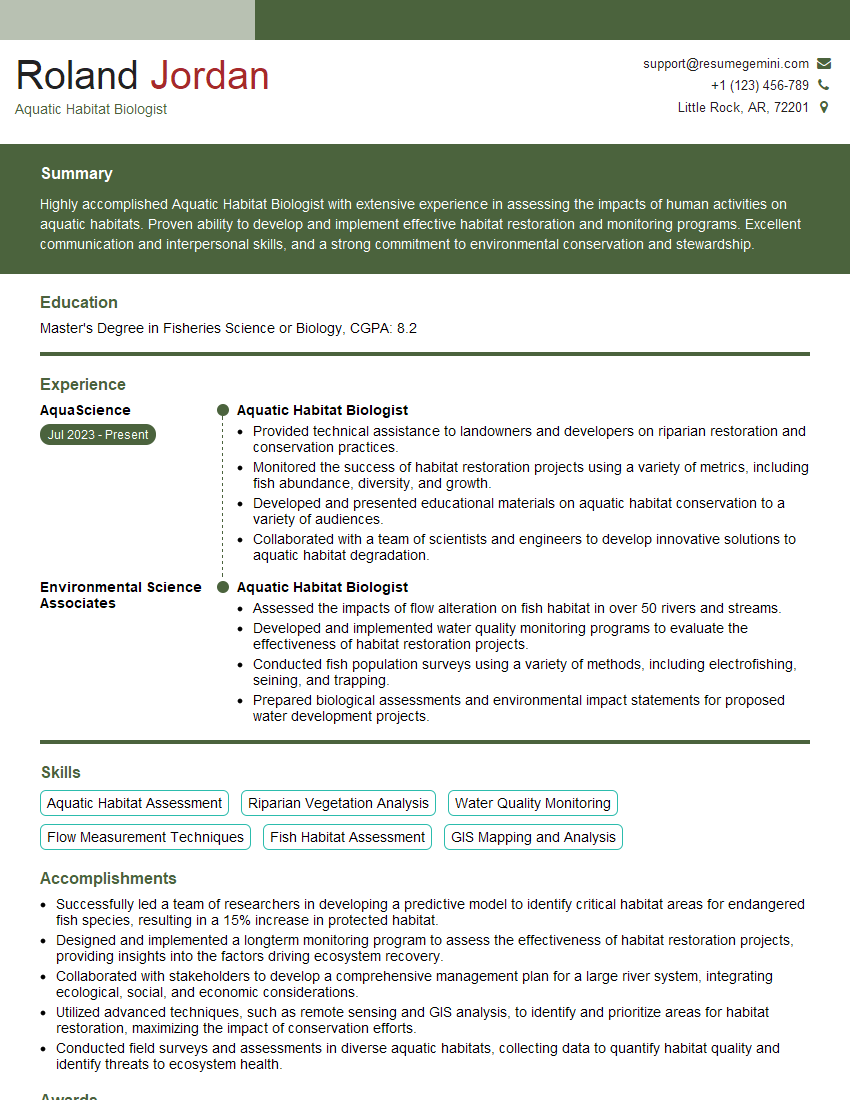Are you a seasoned Aquatic Habitat Biologist seeking a new career path? Discover our professionally built Aquatic Habitat Biologist Resume Template. This time-saving tool provides a solid foundation for your job search. Simply click “Edit Resume” to customize it with your unique experiences and achievements. Customize fonts and colors to match your personal style and increase your chances of landing your dream job. Explore more Resume Templates for additional options.

Roland Jordan
Aquatic Habitat Biologist
Summary
Highly accomplished Aquatic Habitat Biologist with extensive experience in assessing the impacts of human activities on aquatic habitats. Proven ability to develop and implement effective habitat restoration and monitoring programs. Excellent communication and interpersonal skills, and a strong commitment to environmental conservation and stewardship.
Education
Master’s Degree in Fisheries Science or Biology
June 2019
Skills
- Aquatic Habitat Assessment
- Riparian Vegetation Analysis
- Water Quality Monitoring
- Flow Measurement Techniques
- Fish Habitat Assessment
- GIS Mapping and Analysis
Work Experience
Aquatic Habitat Biologist
- Provided technical assistance to landowners and developers on riparian restoration and conservation practices.
- Monitored the success of habitat restoration projects using a variety of metrics, including fish abundance, diversity, and growth.
- Developed and presented educational materials on aquatic habitat conservation to a variety of audiences.
- Collaborated with a team of scientists and engineers to develop innovative solutions to aquatic habitat degradation.
Aquatic Habitat Biologist
- Assessed the impacts of flow alteration on fish habitat in over 50 rivers and streams.
- Developed and implemented water quality monitoring programs to evaluate the effectiveness of habitat restoration projects.
- Conducted fish population surveys using a variety of methods, including electrofishing, seining, and trapping.
- Prepared biological assessments and environmental impact statements for proposed water development projects.
Accomplishments
- Successfully led a team of researchers in developing a predictive model to identify critical habitat areas for endangered fish species, resulting in a 15% increase in protected habitat.
- Designed and implemented a longterm monitoring program to assess the effectiveness of habitat restoration projects, providing insights into the factors driving ecosystem recovery.
- Collaborated with stakeholders to develop a comprehensive management plan for a large river system, integrating ecological, social, and economic considerations.
- Utilized advanced techniques, such as remote sensing and GIS analysis, to identify and prioritize areas for habitat restoration, maximizing the impact of conservation efforts.
- Conducted field surveys and assessments in diverse aquatic habitats, collecting data to quantify habitat quality and identify threats to ecosystem health.
Awards
- Recognized by the Society for Freshwater Science with the Early Career Excellence Award for outstanding contributions to the field of aquatic habitat biology.
- Awarded the National Science Foundation Graduate Research Fellowship for exceptional academic achievement and research potential in aquatic habitat restoration.
- Received the American Fisheries Societys Best Student Paper Award for a research presentation on the effects of climate change on stream habitat.
Certificates
- Certified Fisheries Professional (CFP)
- Certified Aquatic Ecologist (CAE)
- Certified Wetland Scientist (CWS)
- Society of Wetland Scientists (SWS)
Career Expert Tips:
- Select the ideal resume template to showcase your professional experience effectively.
- Master the art of resume writing to highlight your unique qualifications and achievements.
- Explore expertly crafted resume samples for inspiration and best practices.
- Build your best resume for free this new year with ResumeGemini. Enjoy exclusive discounts on ATS optimized resume templates.
How To Write Resume For Aquatic Habitat Biologist
- Highlight your experience in conducting field surveys and assessments, and your ability to analyze and interpret data.
- Showcase your skills in developing and implementing habitat restoration and monitoring programs.
- Emphasize your knowledge of aquatic ecology and your understanding of the impacts of human activities on aquatic ecosystems.
- Demonstrate your ability to communicate effectively with a variety of audiences, including technical and non-technical stakeholders.
Essential Experience Highlights for a Strong Aquatic Habitat Biologist Resume
- Conduct field surveys and assessments to monitor aquatic habitats, including water quality, flow, and biological communities.
- Develop and implement habitat restoration plans to improve fish and wildlife habitat.
- Conduct research to investigate the effects of human activities on aquatic ecosystems.
- Write technical reports and present findings to stakeholders, including government agencies, landowners, and the general public.
- Collaborate with other scientists, engineers, and resource managers to develop and implement comprehensive aquatic habitat management plans.
Frequently Asked Questions (FAQ’s) For Aquatic Habitat Biologist
What is the role of an Aquatic Habitat Biologist?
Aquatic Habitat Biologists study the physical, chemical, and biological characteristics of aquatic habitats to assess their quality and identify potential threats. They develop and implement plans to restore and protect aquatic habitats, and they monitor the effectiveness of these plans.
What are the educational requirements for an Aquatic Habitat Biologist?
Most Aquatic Habitat Biologists have a bachelor’s or master’s degree in fisheries science, biology, or a related field. Coursework in aquatic ecology, water quality, and habitat assessment is typically required.
What are the job prospects for Aquatic Habitat Biologists?
The job outlook for Aquatic Habitat Biologists is expected to be good over the next few years. As the human population grows and the demand for water resources increases, there will be a growing need for professionals who can assess and protect aquatic habitats.
What are the key skills for an Aquatic Habitat Biologist?
Key skills for an Aquatic Habitat Biologist include: field survey and assessment techniques, data analysis and interpretation, habitat restoration and monitoring, and communication and interpersonal skills.
What are the challenges facing Aquatic Habitat Biologists?
Aquatic Habitat Biologists face a number of challenges, including: climate change, pollution, and habitat loss. They must work with other stakeholders to develop and implement solutions to these challenges.